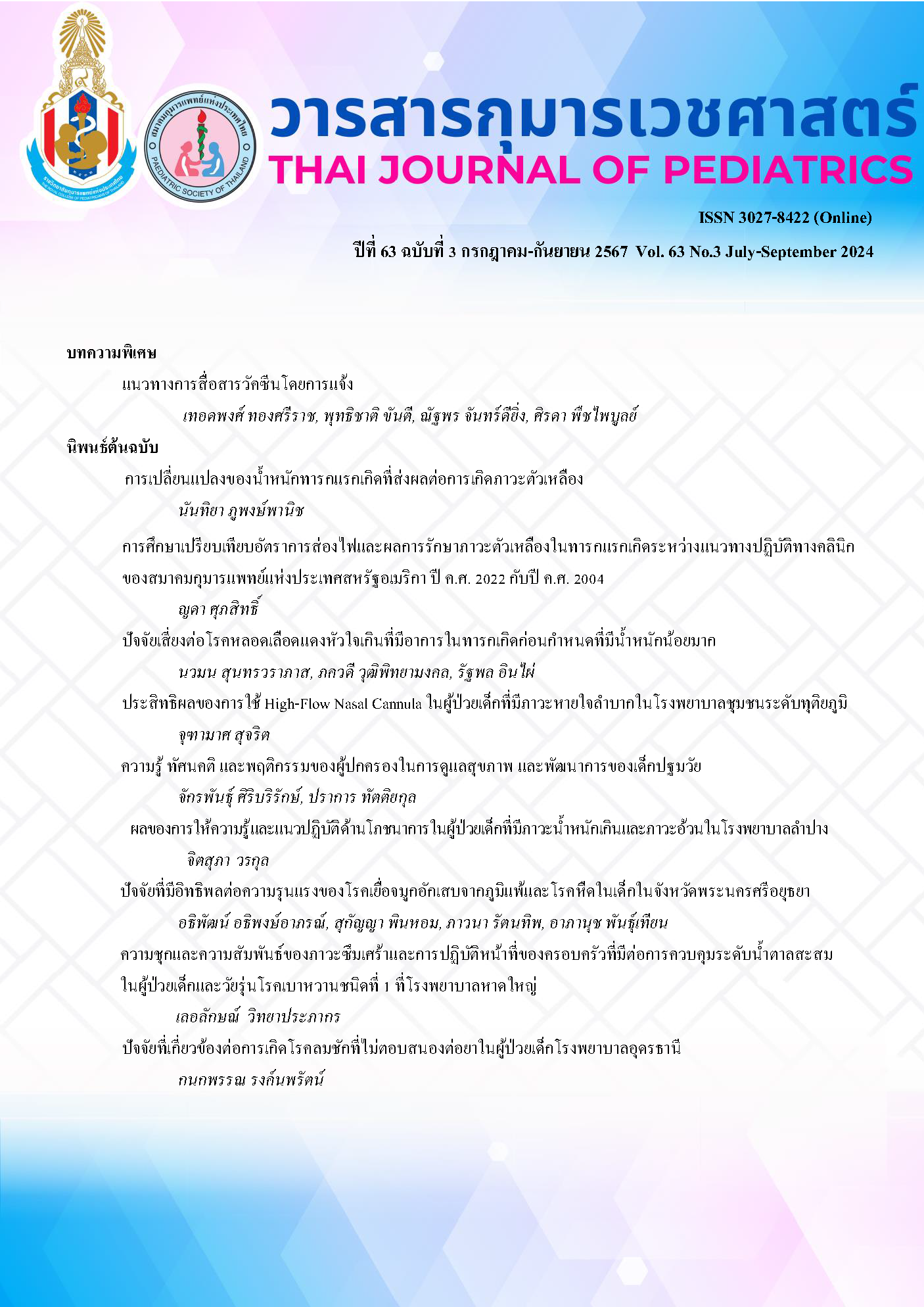Knowledge, attitude and practice of parents in caring for the health and development of preschool children
Keywords:
Knowledge, Attitude, Practice, Preschool children, ParentsAbstract
Background: The early childhood period is crucial for shaping positive characteristics in children and nurturing them into quality adults. Parents play the most significant role in caring for and developing young children. Therefore, the knowledge, attitudes, and good behaviours of parents are of utmost importance.
Objective: The primary outcome is to know the knowledge, attitude, and practice of parents regarding preschool children's health care. The secondary outcome is to know the factors associated with the knowledge, attitude, and practice of parents regarding preschool children's health care.
Methods: This research is a retrospective study based on the survey data that has already been collected. The questionnaire used in the survey gathers information about knowledge, attitudes, and behaviours related to the care of preschool children. Data is collected on-site from parents of preschool children in Kut Ngong Subdistrict, Phanat Nikhom District, Chonburi Province. This data collection was part of the University to Tambon (U2T) project in Kut Ngong.
Results: A total of 210 individuals (from 210 families) participated in the questionnaire. Most of the sample group had low levels of knowledge, high levels of attitude, and high levels of behaviour, with percentages of 43.3, 67.1, and 60.3, respectively. Factors related to the mean of knowledge scores included the average monthly family income and the frequency of childcare arrangements at childcare centres. Factors related to the mean attitude scores included employment status, average monthly family income, the frequency of childcare arrangements at childcare centres, and the child's temperament. The sample group with a family income of less than 10,000 baht had a higher likelihood of having low knowledge and low behavioural levels compared to the group with a family income greater than 20,000 baht, with odds ratios (OR) of 4.78 (95% CI 2.18-10.48) and 5.14 (95%CI 1.48-17.83), respectively.
Conclusion: Most parents have low knowledge, high-level behaviour and attitude towards the care of preschool children. Promoting preschool children care should focus primarily on knowledge, particularly in families with an average monthly income of less than 10,000 baht.
Downloads
References
สำนักงานเทศบาลตำบลกุฎโง้ง. ข้อมูลพื้นฐานตำบล [อินเทอร์เน็ต]. 2564 [เข้าถึงเมื่อ 1 เม.ย. 2567]. เข้าถึงได้จาก: http://kudngong.go.th/public/location/data/index/menu/24.
สุปราณี การพึ่งตน. ความรู้และทัศนคติในการดูแลเรื่องอาหารเด็กเล็กของผู้ปกครองและครูพี่เลี้ยงเด็ก. วารสารพยาบาลศาสตร์ จุฬาลงกรณ์มหาวิทยาลัย 2557;26:52-63.
อุดมพร รักเถาว์, จารุวรรณ วงษ์เวช. ความรู้ ทัศนคติ และพฤติกรรมของผู้ปกครองต่อการดูแลสุขภาพช่องปากเด็กก่อนวัยเรียน. วารสารเครือข่ายวิทยาลัยพยาบาลและการสาธารณสุขภาคใต้ 2558;2:52-64.
สมนึก เลิศสุโภชวณิชย์, มัลลิกา ผดุงหมาย, วรยุทธ นาคอ้าย ,พรศักดิ์ อยู่เจริญ. การศึกษาความรู้ ทัศนคติ และการปฏิบัติเกี่ยวกับการป้องกันควบคุมโรคติดต่อในเด็ก ของผู้ดูแลเด็กและผู้ปกครองเด็ก ปี 2560. วารสารควบคุมโรค 2561;44:207-16.
Matta P, Mouallem RE, Akel M, Hallit S, Khalife MF. Parents' knowledge, attitude and practice towards children's vaccination in Lebanon: Role of the parent-physician communication. BMC public health. 2020;20:1439.
Thac D, Pedersen FK, Thuong TC, Lien le B, Ngoc Anh NT, Phuc NN. South Vietnamese rural mothers' knowledge, attitude, and practice in child health care. Biomed Research International. 2016;2016:9302428.
Bloom BS, Hastings T, Madaus GF. Handbook on formative and summative evaluation of student learning. New York: Mcgraw-hill; 1971:61-86.
Best JW, Kahn JV. Methods and tools of research. In: Best JW, Kahn JV, editors. Research in education. 10rd ed. New Jersey: Prentice-Hall; 1997:295-358.
Begum T. Parental knowledge, attitudes and practices in early childhood development among low income urban parents. Universal Journal of Public Health. 2019:214-26.
Gershoff ET, Aber JL, Raver CC, Lennon MC. Income is not enough: Incorporating material hardship into models of income associations with parenting and child development. Child Development. 2007;78:70-95.
Kalil A, Ryan R. Parenting practices and socioeconomic gaps in childhood outcomes. The Future of Children. 2020;30:29-54.
Lee C-YS, Anderson JR, Horowitz JL, August GJ. Family income and parenting: The role of parental depression and social support. Family Relations. 2009;58:417-30.
Weinberg BA. An incentive model of the effect of parental income on children. Journal of Political Economy. 2001;109:266-80.
Mishra A, Sharma D, Tripathi GM, Khan TA. Rural-urban disparities in knowledge, attitude, and practice toward child oral health among mothers of 9-36-month-old children. JRM. 2023;18:175-81.
Downloads
Published
How to Cite
Issue
Section
License
Copyright (c) 2024 The Royal College of Pediatricians Of Thailand

This work is licensed under a Creative Commons Attribution-NonCommercial-NoDerivatives 4.0 International License.



